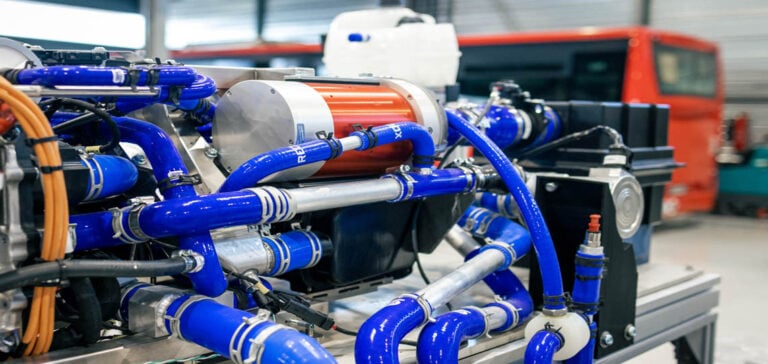FC Lab Belfort revolutionizes hydrogen by developing innovative technology. In 1999, Belfort became the birthplace of a revolutionary research center dedicated to the fuel cell, an essential component of the hydrogen industry. A quarter of a century later, the FC Lab is still in action, working closely with major industrial players. “Here, confidential tests are carried out”, David Bouquain, deputy director of the FC Lab, smiled during a visit organized as part of the “Hydrogen business for climate” forum held in Belfort at the beginning of October.
An essential link between research and industry
The FC Lab is a research unit specializing inhydrogen-based energy systems, bringing together over 150 researchers from higher education establishments and research laboratories. It was launched in 1999 on the initiative of Jean-Pierre Chevènement, then Minister of the Interior, and Claude Allègre, Minister of National Education, Research and Technology. Mr Chevènement, a former Member of Parliament for Belfort, was convinced of the importance of connecting research and industry.
Hydrogen: The Key to Clean Energy
The decision to work on fuel cells was quickly made, as it was clear that intermittent energies such as solar and wind power, whose availability can vary, would one day require a storage vector. This is the role of hydrogen and fuel cells. Today, the laboratory is also working on the electrolyzer, a device that converts electricity into hydrogen for energy storage and transport.
Fruitful collaborations and a promising future
The FC Lab works with some fifteen SMEs and ten major groups. In particular, he has worked with Symbio, a French fuel cell manufacturer and joint venture between Michelin and Forvia, in which Stellantis recently invested. Manufacturers come to the FC Lab with technical problems, and the lab works with them over a period of six to 18 months to overcome the technological obstacles. It plays a crucial role in transferring research skills to industry.
Training for a Hydrogen Future
Marie-Guite Dufay, Socialist President of the Burgundy-Franche-Comté Regional Council, sums up the importance of this research as the foundation of the hydrogen industry. The local authority is following the same vision, responding to a call for projects from the French government to obtain the “National Hydrogen School” label. This label recognizes the organization of a skills and training network designed to meet hydrogen-related skills needs, from training jobseekers to engineers.
Hydrogen: a booming sector
The stakes are clear, as the French hydrogen industry points out: 100,000 jobs by 2030. The FC Lab, with its 25 years of research and innovation, is a key player in this hydrogen revolution in France.
Final Analysis
The FC Lab in Belfort is much more than just a research laboratory. It’s an essential link in France’s drive to develop hydrogen as a clean, sustainable energy source. Since its creation in 1999, it has combined fundamental research with concrete applications for industry. As a “National Hydrogen School” in the making, it prepares tomorrow’s workforce to meet the growing needs of this fast-expanding industry. This 25-year history is a testament to France’s vision and commitment to a successful energy transition.






















